高考英语冲刺导练32
超实用高考英语冲刺复习:写作第一节考前冲刺练(其他文体+图表图画式)- 三年真题研读暨考前冲刺练
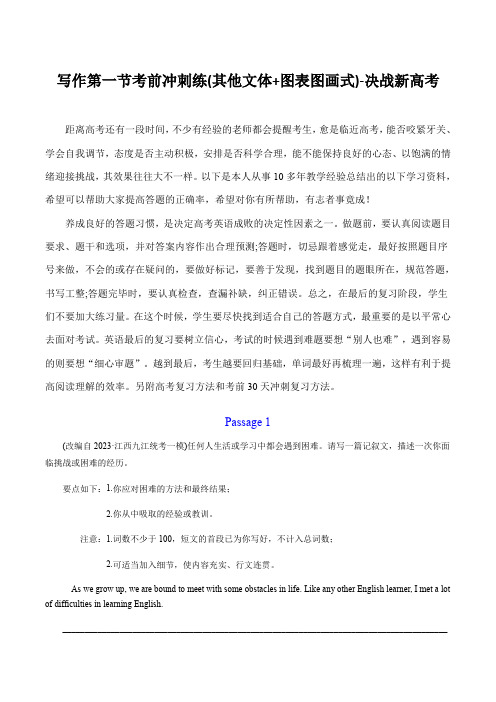
写作第一节考前冲刺练(其他文体+图表图画式)-决战新高考距离高考还有一段时间,不少有经验的老师都会提醒考生,愈是临近高考,能否咬紧牙关、学会自我调节,态度是否主动积极,安排是否科学合理,能不能保持良好的心态、以饱满的情绪迎接挑战,其效果往往大不一样。
以下是本人从事10多年教学经验总结出的以下学习资料,希望可以帮助大家提高答题的正确率,希望对你有所帮助,有志者事竟成!养成良好的答题习惯,是决定高考英语成败的决定性因素之一。
做题前,要认真阅读题目要求、题干和选项,并对答案内容作出合理预测;答题时,切忌跟着感觉走,最好按照题目序号来做,不会的或存在疑问的,要做好标记,要善于发现,找到题目的题眼所在,规范答题,书写工整;答题完毕时,要认真检查,查漏补缺,纠正错误。
总之,在最后的复习阶段,学生们不要加大练习量。
在这个时候,学生要尽快找到适合自己的答题方式,最重要的是以平常心去面对考试。
英语最后的复习要树立信心,考试的时候遇到难题要想“别人也难”,遇到容易的则要想“细心审题”。
越到最后,考生越要回归基础,单词最好再梳理一遍,这样有利于提高阅读理解的效率。
另附高考复习方法和考前30天冲刺复习方法。
Passage 1(改编自2023·江西九江统考一模)任何人生活或学习中都会遇到困难。
请写一篇记叙文,描述一次你面临挑战或困难的经历。
要点如下:1.你应对困难的方法和最终结果;2.你从中吸取的经验或教训。
注意:1.词数不少于100,短文的首段已为你写好,不计入总词数;2.可适当加入细节,使内容充实、行文连贯。
As we grow up, we are bound to meet with some obstacles in life. Like any other English learner, I met a lot of difficulties in learning English.____________________________________________________________________________________________________________________________________________________________________________________ ____________________________________________________________________________________________ ____________________________________________________________________________________________ __________________________________Passage 2(2023秋·广东潮州高三期末统考)假定你是李华,你要参加学校英语报以“Practice makes perfect”为题开展的征文活动。
高考英语冲刺导练高三全册英语试题5
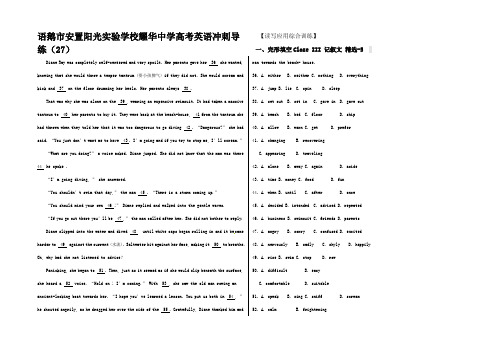
语鹅市安置阳光实验学校耀华中学高考英语冲刺导练(27)【读写应用综合训练】一、完形填空Cloze III 记叙文精选-5Diane Ray was completely self-centered and very spoilt. Her parents gave her 36 she wanted, knowing that she would throw a temper tantrum (耍小孩脾气) if they did not. She would scream and kick and 37 on the floor drumming her heels. Her parents always 38 .That was why she was alone on the 39 , wearing an expensive swimsuit. It had taken a massive tantrum to 40 her parents to buy it. They were back at the beach-house, 41 from the tantrum she had thrown when they told her that it was too dangerous to go diving 42 . “Dangerous?” she had said. “You just don’t want me to have 43 . I’m going and if you try to stop me, I’ll scream.”“What are you doing?” a voice asked. Diane jumped. She did not know that the man was there 44 he spoke .“I’m going diving, ” she answered.“You shouldn’t swim that day,” the man 45 . “There is a storm coming up.”“You should mind your own 46 !” Diane replied and walked into the gentle waves.“If you go out there you’ll be 47 ,” the man called after her. She did not bother to reply.Diane slipped into the water and dived 48 until white caps began rolling in and it be came harder to 49 against the current (水流). Saltwater hit against her face, making it 50 to breathe. Oh, why had she not listened to advice?Panicking, she began to 51 . Then, just as it seemed as if she would slip beneath the surface, she heard a 52 voice. “Hold on ! I’m coming.” With 53 , she saw the old man rowing an ancient-looking boat towards her. “I hope you’ve learned a lesson. You put us both in 54 , ” he shouted angrily, as he dragged her over the side of the 55 . Gratefully, Diane thanked him and ran towards the beach- house.36. A. either B. neither C. nothing D. everything37. A. jump B. lie C. spin D. sleep38. A. set out B. set in C. gave in D. gave out39. A. beach B. bed C. floor D. ship40. A. allow B. warn C. get D. prefer41. A. changing B. recoveringC. appearingD. traveling42. A. alone B. away C. again D. aside43. A. time B. money C. food D. fun44. A. when B. until C. after D. once45. A. decided B. intended C. advised D. repeated46. A. business B. swimsuit C. friends D. parents47. A. angry B. sorry C. confused D. excited48. A. nervously B. sadly C. shyly D. happily49. A. rise B. swim C. stop D. row50. A. difficult B. easyC. comfortableD. suitable51. A. speak B. sing C. sniff D. scream52. A. calm B. frighteningC. beautifulD. disgusting53. A. regret B. relief C. interest D. ease54. A. power B. safety C. danger D. thought55. A. house B. wave C. beach D. boat二、阅读理解Reading Comprehension█阅读微技能 Micro Reading Skills解析与训练系列 13微技能13:.理解逻辑关系Logical clues:高考阅读理解考查要求考生能理解具体的词、句、段乃至整篇不同层次的意义,并能把握全篇文脉,即句与句,段与段的关系,并能据此进行推理和判断。
高考英语冲刺导练高三全册英语试题_21
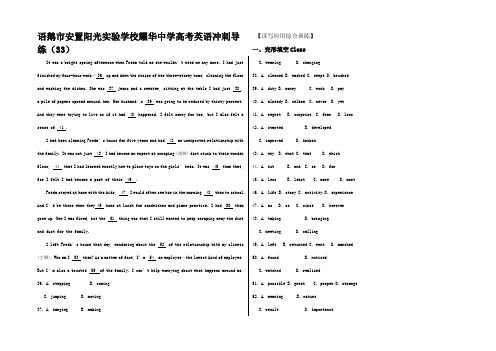
语鹅市安置阳光实验学校耀华中学高考英语冲刺导练(33)【读写应用综合训练】一、完形填空ClozeIt was a bright spring afternoon when Freda told me she wouldn’t need me any more. I had just finished my four-hour work —36 up and down the stairs of her three-storey home, cleaning the floor and washing the dishes. She was 37 jeans and a sweater, sitting at the table I had just 38 , a pile of papers spread around her. Her husband’s 39 was going to be reduced by thirty percent. And they were trying to live as if it had 40 happened. I felt sorry for her, but I also felt a sense of 41 .I had been cleaning Freda’s house for five years and had 42 an unexpected relationship with the family. It was not just 43 I had become an expert at scraping (刮掉) dirt stuck to their wooden floor, 44 that I had learned exactly how to place toys on the girls’ beds. It was 45 than that, for I felt I had become a part of their 46 .Freda stayed at home with the kids, 47 I would often see her in the morning 48 them to school. And I’d be there when they 49 home at lunch for sandwiches and piano practice. I had 50 them grow up. Now I was fired, but the 51 thing was that I still wanted to keep scraping away the dirt and dust for the family.I left Freda’s house that day, wondering about the 52 of the relationship with my clients (主顾). Who am I 53 them? As a matter of fact, I’m 54 an employee—the lowest kind of employee. But I’m also a trusted 55 of the family. I can’t help worrying about what happens around me.36. A. stepping B. comingC. jumpingD. moving37. A. hanging B. makingC. wearingD. changing38. A. cleaned B. washed C. swept D. brushed39. A. duty B. money C. work D. pay40. A. already B. seldom C. never D. yet41. A. regret B. surprise C. fear D. loss42. A. started B. developedC. improvedD. broken43. A. why B. what C. that D. which44. A. but B. and C. or D. for45. A. less B. least C. more D. most46. A. life B. story C. activity D. experience47. A. as B. so C. since D. however48. A. taking B. bringingC. meetingD. calling49. A. left B. returned C. went D. marched50. A. found B. noticedC. watchedD. realized51. A. possible B. great C. proper D. strange52. A. meaning B. natureC. resultD. importance53. A. for B. to C. with D .at54. A. hardly B. certainlyC. probablyD. merely 55. A. member B. personC. relativeD. companion二、阅读理解Reading Comprehension Test☑Reading Skills阅读理解能力■考查 2根据上下文推断生词、短语或句子的词义的含义[能力解析] 根据材料的背景及上下文线索推断词汇、短语在不同语境中的恰当含义或句子的准确意义;➢Passage AWhy play games? Because they are fun, and a lot more besides. Following the rules…planning your next move...acting as a team member…these are all “game” ideas that you will come across throughout your life.Think about some of the games you played as a young child, such as rope-jumping and hide-and-seek. Such games ar e entertaining and fun. But perhaps more importantly, they translate life into exciting dramas that teach children some of the basic rules they will be expected to follow the rest of their lives, such as taking turns and cooperating.Many children’s games have a practical side. Children around the world play games that prepare them for work they will do as grown-ups. For instance, some Saudi Arabian children play a game called bones. Which sharpens the hand-eye coordination (协调) needed in hunting.Many sports encourage national or local pride. The most famous games of all, the Olympic Games, bring athletes from around the world together to take part in friendly competition. People who watch the event wave flags, knowing that a gold medal is a win for an entire country, not just the athlete who earned it. For countries experiencing natural disasters or war, an Olympic win can mean so much.Sports are also an event that unites people. Soccer is the most popular sport in the world. People on all continents play it—some for fun and some for a living. Nicolette Iribarne, a Californian soccer player, has discovered a way to spread hope through soccer. He created a foundation to provide poor children with not only soccer balls but also a promising future.Next time you play your favorite game or sport, think about why you enjoy it, what skills are needed, and whether these skills will help you in other aspects of your life.41. Through playing hide-and-seek, children are expected to learn to ______.A. be a team leaderB. obey the basic rulesC. act as a grown-upD. predict possible danger42. The underlined part in Paragraph 2 most probably means that games can______.A. describe life in an exciting wayB. turn real-life experiences into a playC. make learning life skills more interestingD. change people’s views of sporting events43. According to the passage, why is winning Olympic medals so encouraging?A. It inspires people’s deep love for the country.B. It proves the exceptional skills of the winners.C. It helps the country out of natural disasters.D. It earns the winners fame and fortune.44. Iribarne’s goal of forming the foundation is to ______.A. bring fun to poor kidsB. provide soccer balls for childrenC. give poor kids a chance for a better lifeD. appeal to soccer players to help poor kids45. What can be inferred from the passage?A. Games benefit people all their lives.B. Sports can get all athletes together.C. People are advised to play games for fun.D. Sports increase a country’s competitiveness.➢Passage BFor many parents, raising a teenager is like fighting a long war, but years go by without any clear winner. Like a border conflict between neighboring countries, the parent-teen war is about boundaries: Where is the line between what I control and what you do?Both sides want peace, but neither feels it has any power to stop the conflict. In part, this is because neither is willing to admit any responsibility for starting it. From the parents’ point of view, the only cause of their fight is their adoles cents’ complete unreasonableness. And of course, the teens see it in exactly the same way, except oppositely. Both feel trapped.In this article, I’ll describe three no-win situations that commonly arise between teens and parents and then suggest some ways out of the trap. The first no-win situation is quarrels over unimportant things. Examples include the color of the teen’s hair, the cleanliness of the bedroom, the preferred style of clothing, the child’s failure to eat a good breakfast before school, or his tendency to sleep until noon on the weekends. Second, blaming. The goal of a blaming battle is to make the other admit that his bad attitude is the reason why everything goes wrong. Third, needing to be right. It doesn’t matter what the topic is—politics, the laws of physics, or the proper way to break an egg—the point of these arguments is to prove that you are right and the other person is wrong for both wish to be considered an authority—someone who actually knows something—and therefore to command respect.Unfortunately, as long as parents and teens continue to assume that they know more than the other, they’ll continue to fight these batt les forever and never make any real progress.55. Why does the author compare the parent-teen war to a border conflict?A. both can continue for generations.B. Both are about where to draw the line.C. Neither has any clear winner.D. Neither can be put to an end.56. What does the underlined part in Paragraph 2 mean?A. The teens blame their parents for starting the conflict.B. The teens agree with their parents on the cause of the conflict.C. The teens accuse their parents of misleading them.D. The teens tend to have a full understanding of their parents.57.Parents and teens want to be right because they want to ______.A. give orders to the otherB. know more than the otherC. gain respect from the otherD. get the other to behave properly58. What will the author most probably discuss in the paragraph that follows?A. causes for the parent-teen conflictsB. Examples of the parent-teen war.C. Solutions for the parent-teen problemsD. Future of the parent-teen relationship☑Hot topics 高考高频话题■话题2人物故事 Family, People & Life stories[话题解析]人物与故事类阅读为记叙文。
高考英语冲刺导练高三全册英语试题7
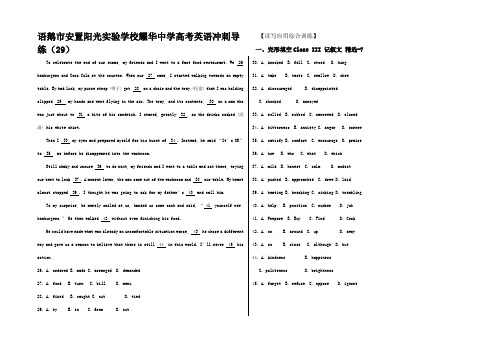
语鹅市安置阳光实验学校耀华中学高考英语冲刺导练(29)【读写应用综合训练】一、完形填空Cloze III 记叙文精选-7To celebrate the end of our exams, my friends and I went to a fast food restaurant. We 26 hamburgers and Coca Cola at the counter. When our 27 came, I started walking towards an empty table. By bad luck, my purse strap (带子) got 28 on a chair and the tray (托盘) that I was holding slipped 29 my hands and went flying in the air. The tray, and its contents, 30 on a man who was just about to 31 a bite of his sandwich. I stared, greatly 32 , as the drinks soaked (浸湿) his white shirt.Then I 33 my eyes and prepared myself for his burst of 34 . Instead, he said “It’s OK” to 35 me before he disappeared into the washroom.Still shaky and unsure 36 to do next, my friends and I went to a table and sat there, trying our best to look 37 . A moment later, the man came out of the washroom and 38 our table. My heart almost stopped 39 . I thought he was going to ask for my fa ther’s 40 and call him.To my surprise, he merely smiled at us, handed us some cash and said, “ 41 yourself new hamburgers.” He then walked 42 without even finishing his food.He could have made what was already an uncomfortable situation worse, 43 he chose a different way and gave us a reason to believe that there is still 44 in this world. I’ll never 45 his action.26. A. ordered B. made C. arranged D. demanded27. A. food B. turn C. bi ll D. menu28. A. fixed B. caught C. cut D. tied29. A. by B. in C. from D. out 30. A. knocked B. fell C. stood D. hung31. A. take B. taste C. swallow D. chew32. A. discouraged B. disappointedC. shockedD. annoyed33. A. rolled B. rubbed C. narrowed D. closed34. A. bitterness B. anxiety C. anger D. sorrow35. A. satisfy B. comfort C. encourage D. praise36. A. how B. who C. what D. which37. A. mild B. honest C. calm D. modest38. A. pushed B. approached C. drew D. laid39. A. beating B. breaking C. sinking D. trembling40. A. help B. position C. number D. job41. A. Prepare B. Buy C. Find D. Cook42. A. on B. around C. up D. away43. A. so B. since C. although D. but44. A. kindness B. happinessC. politenessD. brightness45. A. forget B. refuse C. oppose D. ignore二、阅读理解Reading Comprehension█阅读微技能 Micro Reading Skills解析与训练系列 15 ————————————The End (完结)微技能15:评价阅读内容Evaluation:作者在写作中不仅客观地叙述和说明,往往还持有某种态度,如对某观点赞同或反对,肯定或批评。
高考英语冲刺导练高三全册英语试题1_01
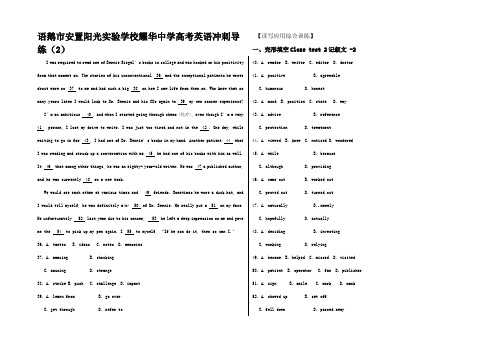
语鹅市安置阳光实验学校耀华中学高考英语冲刺导练(2)【读写应用综合训练】一、完形填空Cloze test 2记叙文 -2I was required to read one of Bernie Siegel’s books in college and was hooked on his positivity from that moment on. The stories of his unconventional 36 and the exceptional patients he wrote about were so 37 to me and had such a big 38 on how I saw life from then on. Who knew that so many years later I would look to Dr. Bernie and his CDs again to 39 my own cancer experience?I’m an ambitious 40 , and when I started going through chemo (化疗), even though I’m a very 41 person, I lost my drive to write. I was just too tired and not in the 42 . One day, while waiting to go in for 43 , I had one of Dr. Bernie’s books in my hand. Another patient 44 what I was reading and struck up a conversation with me 45 he had one of his books with him as well. It 46 that among other things, he was an eighty- year-old writer. He was 47 a published author, and he was currently 48 on a new book.We would see each other at various times and 49 friends. Sometimes he wore a duck hat, and I would tell myself, he was definitely a(n) 50 of Dr. Bernie. He really put a 51 on my face. He unfortunately 52 last year due to his cancer, 53 he left a deep impression on me and gave me the 54 to pick up my pen again. I 55 to myself, “If he can do it, then so can I.”36. A. tastes B. ideas C. notes D. memories37. A. amazing B. shockingC. amusingD. strange38. A. strike B. push C. challenge D. impact39. A. learn from B. go overC. get throughD. refer to 40. A. reader B. writer C. editor D. doctor41. A. positive B. agreeableC. humorousD. honest42. A. mood B. position C. state D. way43. A. advice B. referenceC. protectionD. treatment44. A. viewed B. knew C. noticed D. wondered45. A. while B. becauseC. althoughD. providing46. A. came out B. worked outC. proved outD. turned out47. A. naturally B. merelyC. hopefullyD. actually48. A. deciding B. investingC. workingD. relying49. A. became B. helped C. missed D. visited50. A. patient B. operator C. fan D. publisher51. A. sign B. smile C. mark D. mask52. A. showed up B. set offC. fell downD. passed away53. A. since B. but C. so D. for54. A. guidance B. trust C. opportunity D. inspiration55. A. promised B. swore C. thought D. replied二、【阅读理解】题型解析与训练Reading skill series 1《2015版高考天津卷·考试说明》阅读理解题型考查内容:1细节Supporting Details:具体信息;阐释主旨的细节事实;2指代关系References;3主旨与要义Main Ideas and the Central Point;4推断Inferences:推断词汇、句子意义;根据内容推理判断;5作者的写作意图、观点和态度Purpose and Tone & Fact and Opinion;6语篇:文章结构、上下文的逻辑关系Organization and contextual logic;文体特征和语言风格(文章出处、组织方式)Language style◆—1—推理判断 Inferences & Judgment据以推理的可能是词或句子,也可能是若干句,甚至全文,要想做出精确的推断,必须注意以下四点:1.根据问题,细心把握文章中的全部信息和信息的各个方面。
最热湖北黄冈中学高考英语冲刺导练(3)
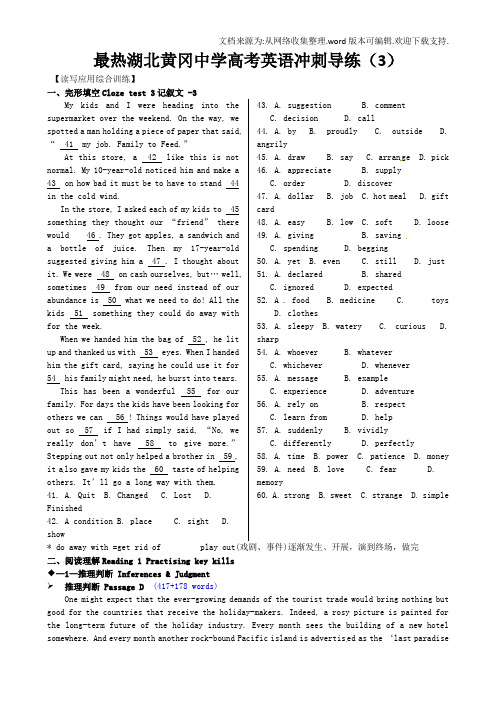
最热湖北黄冈中学高考英语冲刺导练(3)【读写应用综合训练】一、完形填空Cloze test 3记叙文 -3My kids and I were heading into the supermarket over the weekend. On the way, we spotted a man holding a piece of paper that said, “ 41 my job. Family to Feed.”At this store, a 42 like this is not normal. My 10-year-old noticed him and make a 43 on how bad it must be to have to stand 44 in the cold wind.In the store, I asked each of my kids to 45 something they thought our “friend” there would 46 . They got apples, a sandwich anda bottle of juice. Then my 17-year-old suggested giving him a 47 . I thought about it. We were 48 on cash ourselves, but… well, sometimes 49 from our need instead of our abundance is 50 what we need to do! All the kids 51 something they could do away withfor the week.When we handed him the bag of 52 , he litup and thanked us with 53 eyes. When I handed him the gift card, saying he could use it for 54 his family might need, he burst into tears.This has been a wonderful 55 for our family. For days the kids have been looking for others we can 56 ! Things would have played out so 57 if I had simply said, “No, we really don’t have 58 to give more.” Stepping out not only helped a brother in 59 ,it a lso gave my kids the 60 taste of helping others. It’ll go a long way with them.41. A. Quit B. Changed C. Lost D.Finished42. A condition B. place C. sight D. show 43. A. suggestion B. commentC. decisionD. call44. A. by B. proudly C. outside D. angrily45. A. draw B. say C. arran ge D. pick46. A. appreciate B. supplyC. orderD. discover47. A. dollar B. job C. hot meal D. gift card48. A. easy B. low C. soft D. loose49. A. giving B. savingC. spendingD. begging50. A. yet B. even C. still D. just51. A. declared B. sharedC. ignoredD. expected52. A . food B. medicine C. toysD. clothes53. A. sleepy B. watery C. curious D. sharp54. A. whoever B. whateverC. whicheverD. whenever55. A. message B. exampleC. experienceD. adventure56. A. rely on B. respectC. learn fromD. help57. A. suddenly B. vividlyC. differentlyD. perfectly58. A. time B. power C. patience D. money59. A. need B. love C. fear D. memory60. A. strong B. sweet C. strange D. simple* do away with =get rid of play out(戏剧、事件)逐渐发生、开展,演到终场,做完二、阅读理解Reading 1 Practising key kills◆—1—推理判断 Inferences & Judgment➢推理判断 Passage D (417+178 words)One might expect that the ever-growing demands of the tourist trade would bring nothing but good for the countries that receive the holiday-makers. Indeed, a rosy picture is painted for the long-term future of the holiday industry. Every month sees the building of a new hotel(天堂) on earth’.However, the scale and speed of this growth seem set to destroy the very things tourists want to enjoy. In those countries where there was a rush to make quick money out of sea-side holidays, over-crowded beaches and the concrete jungles of endless hotels have begun to lose their appeal.Those countries with little experience of tourism can suffer most. In recent years, Nepal set out to attract foreign visitors to fund developments in health and education. Its forests, full of wildlife and rare flowers, were offered to tourists as one more untouched paradise. In fact, the nature all too soon felt the effects of thousands of holiday-makers traveling through the forest land. Ancient tracks became major routes for the walkers, with the consequent exploitation of precious trees and plants.Not only the environment of a country can suffer from the sudden growth of tourism. The people as well rapidly feel its effects. Farmland makes way for hotels, roads and airports; the old way of life goes. The one-time farmer is now the servant of some multi-national organization; he is no longer his own master. Once it was his back that bore the pain; now it is his smile that is exploited. No doubt he wonders whether he wasn’t happier in his village working his own land.Thankfully, the tourist industry is waking up to the responsibilities it has towards those countries that receive its customers. The protection of wildlife and the creation of national parks go hand in hand with tourist development and in fact obtain financial support from tourist companies. At the same time, tourists are being encouraged to respect not only the countryside they visit but also its people.The way tourism is handled in the next ten years will decide its fate and that of the countries we all want to visit. Their needs and problems are more important than those of the tourist companies. Increased understanding in planning world-wide tourism can preserve the market for these companies. If not, in a few years’ time the very things that attract tourists now may well have been destroyed.71. What does the author indicate in the last sentence of Paragraph 1?A. The Pacific Island is a paradise.B. The Pacific Island is worth visiting.C. The advertisement is not convincing.D. The advertisement is not impressive72. The example of Nepal is used to suggest ______.A. its natural resources are untouchedB. its forests are exploited for farmlandC. it develops well in health and educationD. it suffers from the heavy flow of tourists73. What can we learn about the farmers from Paragraph 4?A. They are happy to work their own lands.B. They have to please the tourists for a living.C. They have to struggle for their indep endence.D. They are proud of working in multi-national organizations.74. Which of the following determines the future of tourism?A. The number of tourists.B. The improvement of services.C. The promotion of new products.D. The management of tourism.75.The author’s attitude towards the development of t he tourist industry is _______.A. optimisticB. doubtfulC. objectiveD. negative➢推理判断 Passage E (458+217 words)using the works of Shakespeare was discussing the role of Brutus in the death of Julius Caesar. “Brutus was not an honorable man,” he said. “He was a traitor (叛徒). And he murdered someone in cold blood.” The agreement was that Brutus had acted with cruelty when other options were available to him. He made a bad decision, they said—at least as it was presented by Shakespeare—to take the lead in murdering Julius Caesar. And though one of the executives acknowledged that Brutus had the good of the republic in mind, Caesar was nevertheless his superior. “You have to endeavor,” the executives said, “our policy is to obey the chain of command.”During the last few years, business executives and book writers looking for a new way to advise corporate America have been exploiting Shakespeare’s wisdom for prof itable ends. None more so than husband and wife team Kenneth and Carol Adelman, well-known advisers to the White House, who started up a training company called “Movers and Shakespeares”. They are amateur Shakespeare scholars and Shakespeare lovers, and they have combined their passion and their high level contacts into a management training business. They conduct between 30 and 40 workshops annually, focusing on half a dozen different plays, mostly for corporations, but also for government agencies.The workshops all take the same form, focusing on a single play as a kind of case study, and using individual scenes as specific lessons. In Julius Caesar, for example, sly provocation (狡诈的挑唆) of Brutus to take up arms against Caesar was the basis for a discussion of methods of team building and grass roots organising.Although neither of the Adelmans is academically trained in literature, the programmes contain plenty of Shakespeare tradition and background. Their workshop on Henry V, for example, includ es a helpful explanation of Henry’s winning strategy at the Battle of Agincourt. But they do come to the text with a few biases (偏见): their reading of Henry V minimises his misuse of power. Instead, they emphasize the story of the youth who seizes opportunity and becomes a masterful leader. And at the workshop on Caesar, Mr. Adelmans had little good to say about Brutus, saying “the noblest Roman of them all” couldn’t make his mind up about things.Many of the participants pointed to very specific elements in the play that they felt to be related. Caesar’s pride, which led to his murder, and Brutus’s mistakes in leading the traitors after the murder, they said, raise vital questions for anyone serving as a business when and how do you resist the boss?73. According to paragraph 1, what did all the executives think of Brutus?A. Cruel.B. Superior.C. Honorable.D. Rude74. According to the passage, the Adelmans set up “Movers and Shakespeares” to ______.A. help executives to understand Shakespeare’s plays betterB. give advice on leadership by analyzing Shakespeare’s playsC. provide case studies of Shakespeare’s plays in literature workshopsD. guide government agencies to follow the characters in Shakespeare’s plays.75. Why do the Adelmans conduct a workshop on Henry V?A. To highlight the importance of catching opportunities.B. To encourage masterful leaders to plan strategies to win.C. To illustrate the harm of prejudices in management.D. To warn executives against power misuse.76. It can be inferred from the passage that ______.A. the Adelmans’ programme proves biased as the roles of characters are maximized.B. executives feel bored with too many specific elements of Shakespeare’s plays.C. the Adelmans will make more profits if they are professional scholars.D. Shakespeare has played an important role in the management field.77. The best title for the passage is ______.A. Shakes peare’s plays: Executives reconsider corporate cultureB. Shakespeare’s plays: An essential key to business successC. Shakespeare’s plays: a lesson for business motivationD. Shakespeare’s plays: Dramatic training brings dramatic results➢推理判断 Passage F 2016 JS_C (594words)El Nin o, a Spanish term for “the Christ child”, was named by South American fisherman who noticed that the global weather pattern, which happens every two to seven years, reduced the amount of fishes caught around Christmas. El Nino sees warm water, collected over several years in the western Pacific, flow back eastwards when winds that normally blow westwards weaken, or sometimes the other way round.The weather effects, both good and bad, are felt in many places. Rich countries gain more from powerful Nino, on balance, than they lose. A study found that a strong Nino in 1997-98 helped America’s economy grow by $15 billion, partly because of better agricultural harvest, farmers in the Midwest gained from extra rain. The total rise in agricultural incomes in rich countries is greater than the fall in poor ones.But in Indonesia extremely dry forests are in flames. A multi-year drought (干旱) in south-east Brazil is becoming worse. Though heavy rains brought about by El Nino may relieve the drought in California, they are likely to cause surface flooding and other disasters.The most recent powerful Nino, in 1997-98, killed around 21,000 people and caused damage worth $36 billion around the globe. But such Ninos come with months of warning, and so much is known about how they happen that governments can prepare. According to the Overseas Development Institute (ODI), however, just 12% of disaster-relief funding in the past two decades has gone on reducing risks in advance, rather than recovery and rebuilding afterwards. This is despite evidence that a dollar spent on risk-reduction saves at least two on reconstruction.Simple improvements to infrastructure (基础设施) can reduce the spread of disease. Better sewers (下水道) make it less likely that heavy rain is followed by an outbreak of the disease of bad stomach. Stronger bridges mean villages are less likely to be left without food and medicine after floods. According to a paper in 2011 by Mr Hsiang and co-authors, civil conflict is relat ed to El Nino’s harmful effects—and the poorer the country, the stronger the link. Though the relationship may not be causal, helping divided communities to prepare for disasters would at least reduce the risk that those disasters are followed by killing and wounding people. Since the poorest are least likely to make up for their losses from disasters linked to El Nino, reducing their losses needs to be the priority.61. What can we learn about El Nino in Paragraph 1?A. It is named after a South American fisherman.B. It takes place almost every year all over the world.C. It forces fishermen to stop catching fish around Christmas.D. It sees the changes of water flow direction in the ocean.62. What may El Ninos bring about to the countries affected?A. Agricultural harvests in rich countries fall.B. Droughts become more harmful than floods.C. Rich countries’ gains are greater than their losses.D. Poor countries suffer less from droughts economically.63. The data provided by ODI in Paragraph 4 suggest that_______.A. more investment should go to risk reductionB. governments of poor countries need more aidC. victims of El Nino deserve more compensationD. recovery and reconstruction should come first64. What is the aut hor’s purpose in writing the passage?A. To introduce El Nino and its origin.B. To explain the consequences of El Nino.C. To show ways of fighting against El Nino.D. To urge people to prepare for El Nino.【语法重点复习导练】语法技能重点复习导练:句子2二、形容词性从句——定语从句-1:限定性从句与非限定性从句考查重点:形容词从句的引导词叫关系词(relative)。
高考英语冲刺导练30201704211108.doc
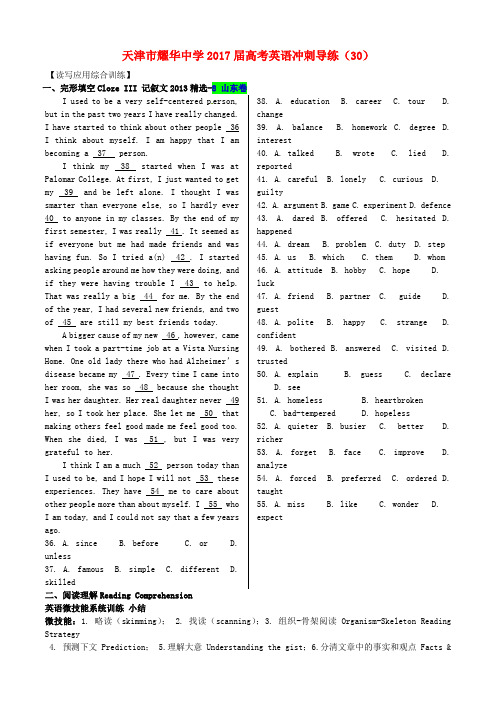
天津市耀华中学2017届高考英语冲刺导练(30)I used to be a very self-centered pbut in theI thinkIPalomarmy 39 and be left alone. I thought I was40 to anyone in my classes. By the end of my firstaskingof theof 45 are still my best friends today.AI was herWhen sheotherI amago.unless37. A.skilled 38. A. education B. career C. tour D. change39. A. balance B. homework C. degree D. interest40. A. talked B. wrote C. lied D. reported41. A. careful B. lonely C. curious D. guilty42. A. argument B. game C. experiment D. defence43. A. dared B. offered C. hesitated D. happened44. A. dream B. problem C. duty D. step45. A. us B. which C. them D. whom46. A. attitude B. hobby C. hope D. luck47. A. friend B. partner C. guide D. guest48. A. polite B. happy C. strange D. confident49. A. bothered B. answered C. visited D. trusted50. A. explain B. guess C. declareD. see51. A. homeless B. heartbrokenC. bad-temperedD. hopeless52. A. quieter B. busier C. better D. richer53. A. forget B. face C. improve D. analyze54. A. forced B. preferred C. ordered D. taught55. A. miss B. like C. wonder D. expect二、阅读理解Reading Comprehension英语微技能系统训练小结微技能:1. 略读(skimming); 2. 找读(scanning);3. 组织-骨架阅读Organism-Skeleton Reading Strategy4. 预测下文Prediction;5.理解大意Understanding the gist;6.分清文章中的事实和观点Facts &Opinions;7. 猜测词义Meaning Guessing;8.推理判断Inference; 9.了解重点细节Key Details;10. 理解文章结构Text Organization;11. 理解图表信息Diagrams;12.理解指代关系Reference;13.理解逻辑关系Logical clues;14.理解作者意图Purposes & Intentions;15.评价阅读内容Evaluation.阅读能力是由各种基于细节的、不同角度的理解综合构成的,平时的训练既注意细节的训练,又注意综合技能训练,同时,随着影响理解能力的词汇、语法、语篇等等层次的语言知识的积累和熟练,就能不断提升理解力,形成出色的阅读理解能力。
2022版新高考英语总复习提能练(二十三)-3-Life-in-the-future-含解析
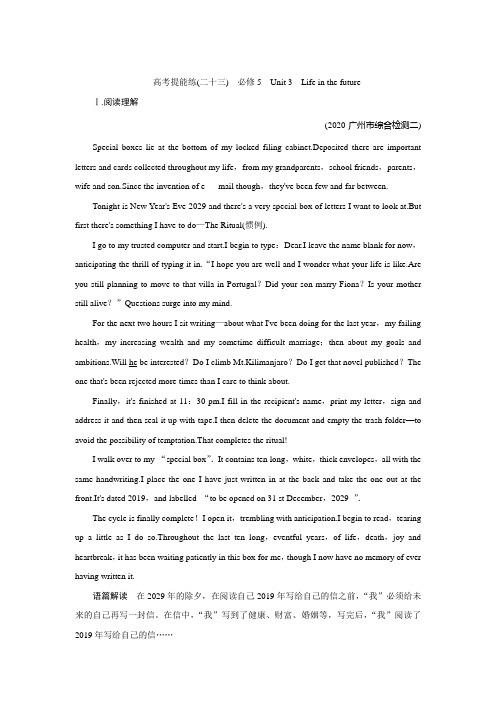
高考提能练(二十三)必修5Unit 3Life in the future Ⅰ.阅读理解(2020·广州市综合检测二) Special boxes lie at the bottom of my locked filing cabinet.Deposited there are important letters and cards collected throughout my life,from my grandparents,school friends,parents,wife and son.Since the invention of e mail though,they've been few and far between.Tonight is New Year's Eve 2029 and there's a very special box of letters I want to look at.But first there's something I have to do—The Ritual(惯例).I go to my trusted computer and start.I begin to type:Dear.I leave the name blank for now,anticipating the thrill of typing it in.“I hope you are well and I wonder what your life is like.Are you still planning to move to that villa in Portugal?Did your son marry Fiona?Is your mother still alive?”Questions surge into my mind.For the next two hours I sit writing—about what I've been doing for the last year,my failing health,my increasing wealth and my sometime difficult marriage;then about my goals and ambitions.Will he be interested?Do I climb Mt.Kilimanjaro?Do I get that novel published?The one that's been rejected more times than I care to think about.Finally,it's finished at 11:30 pm.I fill in the recipient's name,print my letter,sign and address it and then seal it up with tape.I then delete the document and empty the trash folder—to avoid the possibility of temptation.That completes the ritual!I walk over to my “special box”.It contains ten long,white,thick envelopes,all with the same handwriting.I place the one I have just written in at the back and take the one out at the front.It's dated 2019,and labelled “to be opened on 31 st December,2029 ”.The cycle is finally complete!I open it,trembling with anticipation.I begin to read,tearing up a little as I do so.Throughout the last ten long,eventful years,of life,death,joy and heartbreak,it has been waiting patiently in this box for me,though I now have no memory of ever having written it.语篇解读在2029年的除夕,在阅读自己2019年写给自己的信之前,“我”必须给未来的自己再写一封信。
超实用高考英语冲刺复习:完形填空三年真题研读- 三年真题研读暨考前冲刺练(学生版)
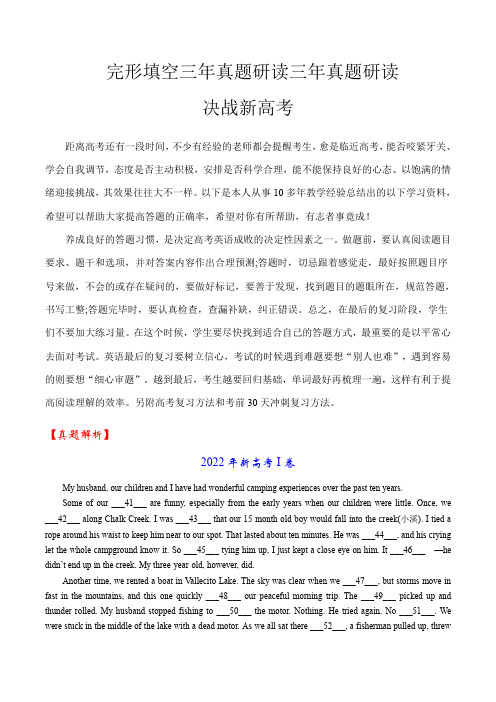
完形填空三年真题研读三年真题研读决战新高考距离高考还有一段时间,不少有经验的老师都会提醒考生,愈是临近高考,能否咬紧牙关、学会自我调节,态度是否主动积极,安排是否科学合理,能不能保持良好的心态、以饱满的情绪迎接挑战,其效果往往大不一样。
以下是本人从事10多年教学经验总结出的以下学习资料,希望可以帮助大家提高答题的正确率,希望对你有所帮助,有志者事竟成!养成良好的答题习惯,是决定高考英语成败的决定性因素之一。
做题前,要认真阅读题目要求、题干和选项,并对答案内容作出合理预测;答题时,切忌跟着感觉走,最好按照题目序号来做,不会的或存在疑问的,要做好标记,要善于发现,找到题目的题眼所在,规范答题,书写工整;答题完毕时,要认真检查,查漏补缺,纠正错误。
总之,在最后的复习阶段,学生们不要加大练习量。
在这个时候,学生要尽快找到适合自己的答题方式,最重要的是以平常心去面对考试。
英语最后的复习要树立信心,考试的时候遇到难题要想“别人也难”,遇到容易的则要想“细心审题”。
越到最后,考生越要回归基础,单词最好再梳理一遍,这样有利于提高阅读理解的效率。
另附高考复习方法和考前30天冲刺复习方法。
【真题解析】2022年新高考I卷My husband, our children and I have had wonderful camping experiences over the past ten years.Some of our ___41___ are funny, especially from the early years when our children were little. Once, we ___42___ along Chalk Creek. I was ___43___ that our 15-month-old boy would fall into the creek(小溪). I tied a rope around his waist to keep him near to our spot. That lasted about ten minutes. He was ___44___, and his crying let the whole campground know it. So ___45___ tying him up, I just kept a close eye on him. It ___46___ —he didn’t end up in the creek. My three-year-old, however, did.Another time, we rented a boat in Vallecito Lake. The sky was clear when we ___47___, but storms move in fast in the mountains, and this one quickly ___48___ our peaceful morning trip. The ___49___ picked up and thunder rolled. My husband stopped fishing to ___50___ the motor. Nothing. He tried again. No ___51___. We were stuck in the middle of the lake with a dead motor. As we all sat there ___52___, a fisherman pulled up, threwus a rope and towed(拖)us back. We were ___53___.Now, every year when my husband pulls our camper out of the garage, we are filled with a sense of ___54___, wondering what camping fun and ___55___ we will experience next.41. A. ideas B. jokes C. memories D. discoveries42. A. camped B. drove C. walked D. cycled43. A. annoyed B. surprised C. disappointed D. worried44. A. unhurt B. unfortunate C. uncomfortable D. unafraid45. A. due to B. instead of C. apart from D. as for46. A. worked B. happened C. mattered D. changed47. A. signed up B. calmed down C. checked out D. headed off48. A. arranged B. interrupted C. completed D. recorded49. A. wind B. noise C. temperature D. speed50. A. find B. hide C. start D. fix51. A. luck B. answer C. wonder D. signal52. A. patiently B. tirelessly C. doubtfully D. helplessly53. A. sorry B. brave C. safe D. right54. A. relief B. duty C. pride D. excitement55. A. failure B. adventure C. performance D. conflict2021年新高考I卷(2021·新高考I卷)My life as a tax-paying employed person began in middle school, when, for three whole days, I worked in a baking factory.My best friend Betsy’s father was a manager at Hough Bakeries, which, at Easter time, ___41___ little bunny(兔子)cakes for all its ___42___ throughout Cleveland. It happened that the plant downtown needed eight kids for ___43___ help during our spring break, for which I had no___44___ beyond listening to my favorite records. I’d ___45___ minimum wage. I’d see how a factory ___46___. My parents thought all of this was a grand idea and called Betsy’s dad with their ___47___.Our ___48___ in the factory were simple: Place cakes on a moving belt. Attach icing(糖霜)ears. Apply icing eyes and nose. ___49___ bunny from the belt. This was ___50___ than it sounds. ___51___ a bit and the cakes pile up. As I told my parents at dinner that first night, it was all a little more high-pressure than I’d ___52___ .Dad ___53___. The son of a grocer, he’d spent the summers of his childhood ___54___ food in Benardsville, New Jersey. This was the sort of work that made you ___55___ the dollars you earned and respect those who did the work, he told me.41. A. sold B. ordered C. made D. reserved42. A. stores B. families C. schools D. citizens43. A. generous B. financial C. technical D. temporary44. A. plans B. problems C. excuses D. hobbies45. A. offer B. earn C. set D. suggest46. A. worked B. closed C. developed D. survived47. A. ambition B. permission C. experience D. invitation48. A. joys B. ideas C. roles D. choices49. A. Save B. Keep C. Stop D. Remove50. A. harder B. better C. longer D. cheaper51. A. Calm down B. Slow down C. Stay on D. Move on52. A. indicated B. witnessed C. expected D. remembered53. A. cried B. smiled C. hesitated D. refused54. A. tasting B. finding C. sharing D. delivering55. A. withdraw B. donate C. receive D. appreciate2020年新高考I卷Molai grew up in a tiny village in India. The village lay near some wetlands which became his second ___21___. He learned the value and beauty of ___22___ there from a very young age.When he was 16, Molai began to notice something ___23___ happening around his home. A flood had hit the area earlier that year and the ___24___ it caused had driven away a number of birds. ___25___, the number of snakes had declined as well. He ___26___ that it was because there weren’t enough trees to protect them from the ___27___. The solution, of course, was to plant trees so the animals could seek ___28___ during the daytime. He turned to the ___29___ department for help but was told that nothing would grow there. However, Molai went looking on his own and ___30___ a nearby island where he began to plant trees.___31___ young plants in the dry season was ___32___ for a lone boy. Molai built at the ___33___ of each sapling(幼树)a bamboo platform, where he placed earthen pots with small holes to ___34___ rainwater. The water would then drip(滴落)on the plants below.Molai ___35___ to plant trees for the next 37 years. His efforts have resulted in 1,360 acres of naturally-grown land that has become home to many plants and animals.21. A. dream B. job C. home D. choice22. A. nature B. youth C. culture D. knowledge23. A. precious B. interesting C. disturbing D. awkward24. A. waste B. tension C. pain D. damage25. A. Besides B. However C. Therefore D. Otherwise26. A. agreed B. realized C. remembered D. predicted27. A. noise B. heat C. disease D. dust28. A. directions B. partners C. help D. shelter29. A. labor B. police C. forest D. finance30. A. rebuilt B. discovered C. left D. managed31. A. Decorating B. Observing C. Watering D. Guarding32. A. tough B. illegal C. fantastic D. beneficial33. A. back B. top C. foot D. side34. A. cool down B. keep off C. purify D. collect35. A. returned B. learned C. failed D. continued【真题研读】从题材上看:从备选项所涉及词类的看:从所挖空的特点看:其中最为引人注目的是:【解题指导】一、研读四种文体特点在完形填空语篇阅读中,研读文体特点,正确运用文体意识有助于快速洞悉文章脉络和提升答题的准确率。
高考英语冲刺导练高三全册英语试题_01
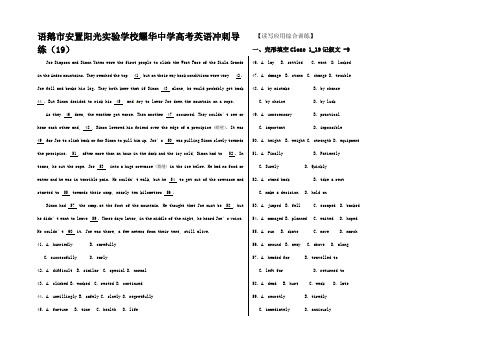
语鹅市安置阳光实验学校耀华中学高考英语冲刺导练(19)【读写应用综合训练】一、完形填空Cloze 1_19记叙文 -9Joe Simpson and Simon Yates were the first people to climb the West Face of the Siula Grandein the Andes mountains. They reached the top 41 , but on their way back conditions were very 42 . Joe fell and broke his leg. They both knew that if Simon 43 alone, he would probably get back 44 . But Simon decided to risk his 45 and try to lower Joe down the mountain on a rope.As they 46 down, the weather got worse. Then another 47 occurred. They couldn’t see or hear each other and, 48 , Simon lowered his friend over the edge of a precipice (峭壁). It was 49 for Joe to climb back or for Simon to pull him up. Joe’s 50 was pulling Simon slowly towards the precipice. 51 , after more than an hour in the dark and the icy cold, Simon had to 52 . In tears, he cut the rope. Joe 53 into a huge crevasse (裂缝) in the ice below. He had no food or water and he was in terrible pain. He couldn’t walk, but he 54 to get out of the crevasse and started to 55 towards their camp, nearly ten kilometers 56 .Simon had 57 the camp at the foot of the mountain. He thought that Joe must be 58 , but he didn’t want to leave 59 . Three days later, in the middle of the night, he heard Joe’s voice. He couldn’t 60 it. Joe was there, a few meters from their tent, still alive.41. A. hurriedly B. carefullyC. successfullyD. early42. A. difficult B. similar C. special D. normal43. A. climbed B. worked C. rested D. continued44. A. unwillingly B. safely C. slowly D. regretfully45. A. fortune B. time C. health D. life 46. A. lay B. settled C. went D. looked47. A. damage B. storm C. change D. trouble48. A. by mistake B. by chanceC. by choiceD. by luck49. A. unnecessary B. practicalC. importantD. impossible50. A. height B. weight C. strength D. equipment51. A. Finally B. PatientlyC. SurelyD. Quickly52. A. stand back B. take a restC. make a decisionD. hold on53. A. jumped B. fell C. escaped D. backed54. A. managed B. planned C. waited D. hoped55. A. run B. skate C. move D. march56. A. around B. away C. above D. along57. A. headed for B. travelled toC. left forD. returned to58. A. dead B. hurt C. weak D. late59. A. secretly B. tiredlyC. immediatelyD. anxiously60. A. find B. believe C. make D. accept二、阅读理解Reading Comprehension█阅读微技能 Micro Reading Skills解析与训练系列微技能:5.理解大意General idea;测试考生对一篇文章或一段文字的深层理解程度以及在速读中准确把握文章主旨大意的能力。
高考英语冲刺导练(4)高三全册英语试题
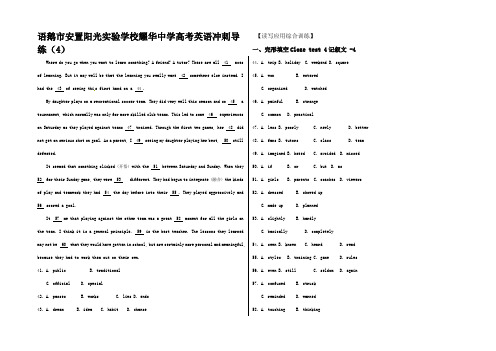
语鹅市安置阳光实验学校耀华中学高考英语冲刺导练(4)【读写应用综合训练】一、完形填空Cloze test 4记叙文 -4Where do you go when you want to learn something? A friend? A tutor? These are all 41 aces of learning. But it may well be that the learning you really want 42 somewhere else instead. I had the 43 of seeing thi s first hand on a 44 .My daughter plays on a recreational soccer team. They did very well this season and so 45 a tournament, which normally was only for more skilled club teams. This led to some 46 experiences on Saturday as they played against teams 47 trained. Through the first two games, her 48 did not get on serious shot on goal. As a parent, I 49 seeing my daughter playing her best, 50 still defeated.It seemed that something clicked (开悟) with the 51 between Saturday and Sunday. When they 52 for their Sunday game, they were 53 different. They had begun to integrate (融合) the kinds of play and teamwork they had 54 the day before into their 55 . They played aggressively and 56 scored a goal.It 57 me that playing against the other team was a great 58 moment for all the girls on the team. I think it is a general principle. 59 is the best teacher. The lessons they learned may not be 60 what they would have gotten in school, but are certainly more personal and meaningful, because they had to work them out on their own.41. A. public B. traditionalC. officialD. special42. A. passes B. works C. lies D. ends43. A. dream B. idea C. habit D. chance 44. A. trip B. holiday C. weekend D. square45. A. won B. enteredC. organizedD. watched46. A. painful B. strangeC. commonD. practical47. A. less B. poorly C. newly D. better48. A. fans B. tutors C. class D. team49. A. imagined B. hated C. avoided D. missed50. A. if B. or C. but D. as51. A. girls B. parents C. coaches D. viewers52. A. dressed B. showed upC. made upD. planned53. A. slightly B. hardlyC. basicallyD. completely54. A. seen B. known C. heard D. read55. A. styles B. training C. game D. rules56. A. even B. still C. seldom D. again57. A. confused B. struckC. remindedD. warned58. A. touching B. thinkingC. encouragingD. learning59. A. Experience B. IndependenceC. CuriosityD. Interest 60. A. harmful to B. mixed withC. different fromD. applied to二、阅读理解Reading 2 Practising key kills 2-1◆—2—主旨大意 Main idea /Subject/Topic / Best title主要考查把握全文主题和理解中心思想的能力,也包括分析、归纳文章的段落大意、重要情节、人物特征、环境特点的能力。
高考英语冲刺导练(40)-人教版高三全册英语试题
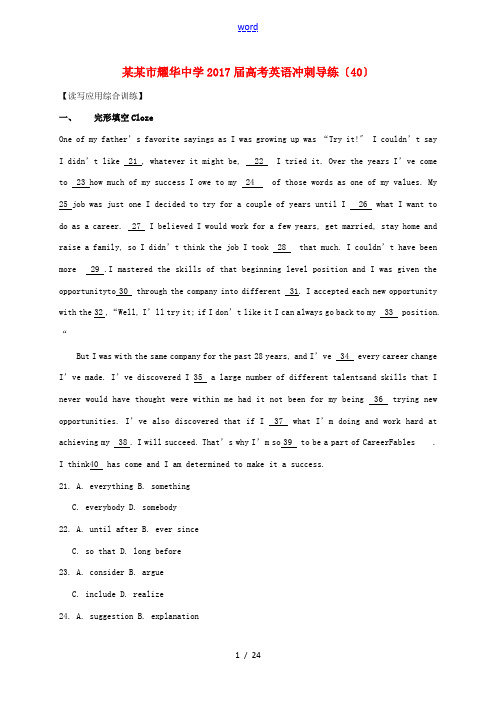
某某市耀华中学2017届高考英语冲刺导练〔40〕【读写应用综合训练】一、完形填空ClozeOne of my father’s favorite sayings as I was growing up was “Try it!〞I couldn’t say I didn’t like 21 , whatever it might be, 22 I tried it. Over the years I’ve come to 23 how much of my success I owe to my 24 of those words as one of my values. My 25 job was just one I decided to try for a couple of years until I 26 what I want to do as a career. 27 I believed I would work for a few years, get married, stay home and raise a family, so I didn’t think the job I took 28 that much. I couldn’t have been more 29 .I mastered the skills of that beginning level position and I was given the opportunityto 30 through the company into different 31. I accepted each new opportunity with the 32 ,“Well, I’ll try it; if I don’t like it I can always go back to my 33 position. “But I was with the same company for the past 28 years, and I’ve 34 every career change I’ve made. I’ve discovered I 35 a large number of different talentsand skills that I never would have thought were within me had it not been for my being 36 trying new opportunities. I’ve also discovered that if I 37 what I’m doing and work hard at achieving my 38 . I will succeed. That’s why I’m so39 to be a part of CareerFables .I think40 has come and I am determined to make it a success.21. A. everything B. somethingC. everybodyD. somebody22. A. until after B. ever sinceC. so thatD. long before23. A. consider B. argueC. includeD. realize24. A. suggestion B. explanationC. acceptanceD. discussion25. A. hard B. best C. extraD. first26. A. determined B. examinedC. experiencedD. introduced27. A. Actually B. GraduallyC. FinallyD. Usually28. A. helped B. requiredC. expressedD. mattered29. A. careful B. mistakenC. interestedD. prepared30. A. look up B. take upC. move upD. put up31. A. situations B. choicesC. directionsD. positions32. A. thought B. replyC. action D. advice33. A. easier B. newer C. earlierD. higher34. A. permitted B. countedC. organizedD. enjoyed35. A. show B. possessC. need D. gather36. A. lucky for B. slow atC. open toD. afraid of37. A. think of B. give awayC. believe inD. turn into38. A. business B. goal C. fortune D. growth39. A. excited B. curiousC. surprisedD. helpful40. A. dream B. time C. powerD. honor二、阅读理解Reading Comprehension Test 话题9 广告应用Advertisements & Practical readings [话题解析]广告类和应用文类的阅读是高考阅读中较多的文体,此类文贴近生活,语言表现力较强。
高考英语冲刺导练高三全册英语试题_
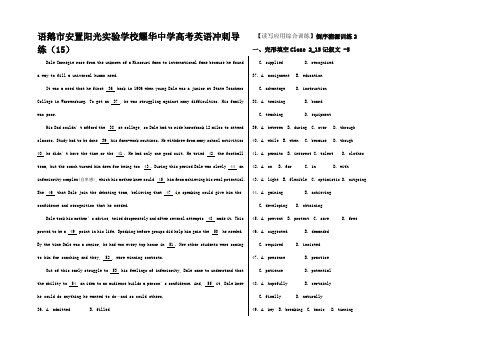
语鹅市安置阳光实验学校耀华中学高考英语冲刺导练(15)【读写应用综合训练】倒序溯源训练2一、完形填空Cloze 2_15记叙文 -5Dale Carnegie rose from the unknown of a Missouri farm to international fame because he found a way to fill a universal human need.It was a need that he first 36 back in 1906 when young Dale was a junior at State Teachers College in Warrensburg. To get an 37 , he was struggling against many difficulties. His family was poor.His Dad couldn’t afford the 38 at college, so Dale had to ride horseback 12 miles to attend classes. Study had to be done 39 his farm-work routines. He withdrew from many school activities 40 he didn’t have the time or the 41 . He had only one good suit. He tried 42 the football team, but the coach turned him down for being too 43 . During this period Dale was slowly 44 an inferiority complex(自卑感), which his mother knew could 45 him from achieving his real potential. She 46 that Dale join the debating team, believing that 47 i n speaking could give him the confidence and recognition that he needed.Dale took his mother’s advice, tried desperately and after several attempts 48 made it. This proved to be a 49 point in his life. Speaking before groups did help him gain the 50 he needed. By the time Dale was a senior, he had won every top honor in 51 . Now other students were coming to him for coaching and they, 52 , were winning contests.Out of this early struggle to 53 his feelings of inferiority, Dale came to understand that the ability to 54 an idea to an audience builds a person’s confidence. And, 55 it, Dale knew he could do anything he wanted to do—and so could others.36. A. admitted B. filled C. supplied D. recognized37. A. assignment B. educationC. advantageD. instruction38. A. training B. boardC. teachingD. equipment39. A. between B. during C. over D. through40. A. while B. when C. because D. though41. A. permits B. interest C. talent D. clothes42. A. on B. for C. in D. with43. A. light B. flexible C. optimistic D. outgoing44. A. gaining B. achievingC. developingD. obtaining45. A. prevent B. protect C. save D. free46. A. suggested B. demandedC. requiredD. insisted47. A. presence B. practiceC. patienceD. potential48. A. hopefully B. certainlyC. finallyD. naturally49. A. key B. breaking C. basic D. turning50. A. progress B. experienceC. competenceD. confidence51. A. horse-riding B. footballC. speechD. farming52. A. in return B. in brief C. in turn D. in fact 53. A. convey B. overcomeC. understandD. build54. A. express B. stress C. contribute D. repeat55. A. besides B. beyond C. like D. with二、阅读理解Reading Comprehension█阅读微技能 Micro Reading Skills解析与训练系列目的:形成阅读策略;培养语感(语言意识);提升语言的理解、信息处理、问题的分析和解决能力。
高考英语冲刺导练高三全册英语试题_6
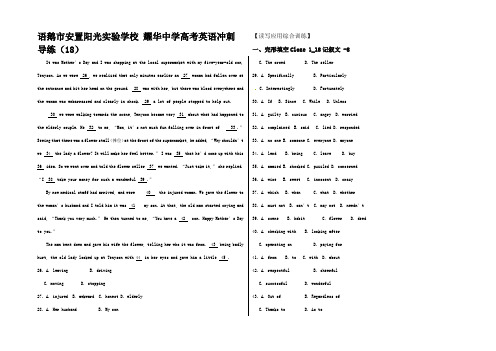
语鹅市安置阳光实验学校耀华中学高考英语冲刺导练(18)【读写应用综合训练】一、完形填空Cloze 1_18记叙文 -8It was Mother’s Day and I was shopping at the local supermarket with my five-year-old son, Tenyson. As we were 26 , we realized that only minutes earlier an 27 woman had fallen over at the entrance and hit her head on the ground. 28 was with her, but there was blood everywhere and the woman was embarrassed and clearly in shock. 29 a lot of people stopped to help out.30 we were walking towards the scene, Tenyson became very 31 about what had happened to the elderly couple. He 32 to me, “Mom, it’s not much fun falling over in front of 33 .” Seeing that there was a flower stall(摊位)at the front of the supermarket, he added, “Why shouldn’t we 34 the lady a flower? It will make her feel better.” I was 35 that he’d come up with this 36 idea. So we went over and told the flower seller 37 we wanted. “Just take it,” she replied. “I 38 take your money for such a wonderful 39 .”By now medical staff had arrived, and were 40 the injured woman. We gave the flower to the woman’s husband and I told him it was 41 my son. At that, the old man started crying and said, “Thank you very much.” He then turned to me, “You have a 42 son. Happy Mot her’s Day to you.”The man bent down and gave his wife the flower, telling her who it was from. 43 being badly hurt, the old lady looked up at Tenyson with 44 in her eyes and gave him a little 45 .26. A. leaving B. drivingC. movingD. stopping27. A. injured B. awkward C. honest D. elderly28. A. Her husband B. My son C. The crowd D. The seller29. A. Specifically B. ParticularlyC. InterestinglyD. Fortunately30. A. If B. Since C. While D. Unless31. A. guilty B. curious C. angry D. worried32. A. complained B. said C. lied D. responded33. A. no one B. someone C. everyone D. anyone34. A. lend B. bring C. leave D. buy35. A. amazed B. shocked C. puzzled D. concerned36. A. wise B. sweet C. innocent D. crazy37. A. which B. when C. what D. whether38. A. must not B. can’t C. may not D. needn’t39. A. scene B. habit C. flower D. deed40. A. checking with B. looking afterC. operating onD. paying for41. A. from B. to C. with D. about42. A. respectful B. cheerfulC. successfulD. wonderful43. A. Out of B. Regardless ofC. Thanks toD. As to44. A. love B. hope C. pity D. pain45. A. idea B. money C. smile D. comfort二、阅读理解Reading Comprehension阅读微技能 Micro Reading Skills解析与训练系列微技能:4. 预测下文Making Prediction;预测是指读者在阅读之前、之中,根据文章提供的各种线索,结合读者已有的知识和经验,对文章的主题、内容、写作方式等预先进行的推测和判断。
高中英语高考英语冲刺导练32
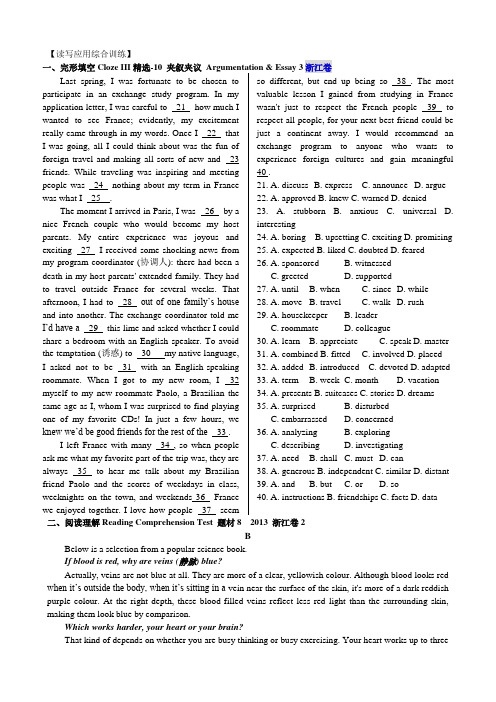
【读写应用综合训练】一、完形填空Cloze III精选-10夹叙夹议Argumentation & Essay 3浙江卷Last spring, I was fortunate to be chosen to participate in an exchange study program. In my application letter, I was careful to 21 how much I wanted to sec France; evidently, my excitement really came through in my words. Once I 22 that I was going, all I could think about was the fun of foreign travel and making all sorts of new and 23 friends. While traveling was inspiring and meeting people was 24 nothing about my term in France was what I 25 .The moment I arrived in Paris, I was 26 by a nice French couple who would become my host parents. My entire experience was joyous and exciting 27 I received some shocking news from my program coordinator (协调人): there had been a death in my host parents' extended family. They had to travel outside France for several weeks. That afternoon, I had to 28 out of one family’s house and into another. The exchange coordinator told me I’d have a 29 this lime and asked whether I could share a bedroom with an English speaker. To avoid the temptation (诱惑) to 30 my native language, I asked not to be 31 with an English-speaking roommate. When I got to my new room, I 32 myself to my new roommate Paolo, a Brazilianthe same age as I, whom I was surprised to find playing one of my favorite CDs! In just a few hours, we knew we’d be good friends for the rest of the 33 .I left France with many 34 , so when people ask me what my favorite part of the trip was, they are always 35 to hear me talk about my Brazilian friend Paolo and the scores of weekdays in class, weeknights on the town, and weekends 36 France we enjoyed together. I love how people 37 seem so different, but end up being so 38 . The most valuable lesson I gained from studying in France wasn't just to respect the French people 39 to respect all people, for your next best friend could be just a continent away. I would recommend an exchange program to anyone who wants to experience foreign cultures and gain meaningful 40 .21. A. discuss B. express C. announce D. argue22. A. approved B. knew C. warned D. denied23. A. stubborn B. anxious C. universal D. interesting24. A. boring B. upsetting C. exciting D. promising25. A. expected B. liked C. doubted D. feared26. A. sponsored B. witnessedC. greetedD. supported27. A. until B. when C. since D. while28. A. move B. travel C. walk D. rush29. A. housekeeper B. leaderC. roommateD. colleague30. A. learn B. appreciate C. speak D. master31. A. combined B. fitted C. involved D. placed32. A. added B. introduced C. devoted D. adapted33. A. term B. week C. month D. vacation34. A. presents B. suitcases C. stories D. dreams35. A. surprised B. disturbedC. embarrassedD. concerned36. A. analyzing B. exploringC. describingD. investigating37. A. need B. shall C. must D. can38. A. generous B. independent C. similar D. distant39. A. and B. but C. or D. so40. A. instructions B. friendships C. facts D. data二、阅读理解Reading Comprehension Test 题材8 2013 浙江卷2BBelow is a selection from a popular science book.If blood is red, why are veins (静脉) blue?Actually, veins are not blue at all. They are more of a clear, yellowish colour. Although blood looks red when it’s outside the body, when it’s sitting in a vein near the surface of the skin, it's more of a dark reddish purple colour. At the right depth, these blood-filled veins reflect less red light than the surrounding skin, making them look blue by comparison.Which works harder, your heart or your brain?That kind of depends on whether you are busy thinking or busy exercising. Your heart works up to threetimes harder during exercise, and shifts enough blood over a lifetime to fill a supertanker. But, in the long run, your brain probably tips it, because even when you're sitting still your brain is using twice as much energy as your heart, and it takes four to five times as much blood to feed it.Why do teeth fall out, and why don't they grow back in grown-ups?Baby (or “milk") teeth do not last long; they fall out to make room for bigger, stronger adult teeth later OIL Adult teeth fall out when they become damaged, decayed and infected by bacteria. Once this second set of teeth has grown in, you're done. When they are gone, they're gone. This is because nat ure figures you’re set for life, and what controls regrowth of your teeth switches off.Do old people shrink as they age?Yes and no. Many people do get shorter as they age. But, when they do, it isn’t because they’re shrinking all over. They simply lose height as their spine (脊柱) becomes shorter and more curved due to disuse and the effects j of gravity. Many (but not all) men and women do lose height as they get older. Men lose an average of 3-4 cm in height as they age, while women may lose 5 cm or more. If you live to be 200 years old, would you keep shrinking till you were, like 60 cm tall, like a little boy again? No, because old people don’t really shrink! It is not that they are growing backwards —their legs, arms and backbones getting shorter. When they do get shorter, it's because the spine has shortened a little. Or, more often become more bent and curved.Why does spinning make you dizzy(眩晕的)?Because your brain gets confused between what you’re seeing and what you’re feeling. The brain senses th at you’re spinning using special gravity-and-motion-sensing organs in your inner ear, which work together with your eyes to keep your vision and balance stable. But when you suddenly stop spinning the system goes out of control, and your brain thinks you'r e moving while you’re not!Where do feelings and emotions come from?Mostly from an ancient part of the brain called the limbic system. All mammals have this brain area —from mice to dogs, cats, and humans. So all mammals feel basic emotions like fear, pain and pleasure. But since human feelings also involve other, newer bits of the brain, we feel more complex emotions than any other animal on the planet.If exercise wears you out, how can it be good for you?Because our bodies adapt to everything we do to them. And as far as your body is concerned, it’s “use it, or lose it"! It’s not that exercise makes you healthy; it’s more than a lack of exercise leaves your body weak and easily affected by disease.46. What is the colour of blood in a vein near the surface of the akin?A. Blue.B. Light yellow.C. Red.D. Dark reddish purple.47. Why do some old people look a little shrunken as they age?A. Because their spine is in active use.B. Because they are more easily affected by gravity.C. Because they keep growing backwards.D. Because their spine becomes more bent.48. Which of the following statements about our brain is true?A. In the long run, our brain probably works harder than our heart.B. When our brain senses the spinning, we will feel dizzy.C. The brains of the other mammals are as complex as those of humans.D. Our feelings and emotions come from the most developed area in our brain.49. What is the main purpose of the selection?A. To give advice on how to stay healthy.B. To provide information about our body.C. To challenge new findings in medical research.D. To report the latest discoveries in medical science.CThe baby monkey is much more developed at birth than the human baby. Almost from the moment it isborn, the baby monkey can move around and hold tightly to its mother. During the first few days of its life the baby will approach and hold onto almost any large, warm, and soft object in its environment, particularly if that object also gives it milk. After a week or so, however, the baby monkey begins to avoid newcomers and focuses its attentions on “mother” — the real mother or the mother-substitute (母亲替代物).During the first two weeks of its life warmth is perhaps the most important psychological (心理的) thing that a monkey mother has to give to its baby. The Harlows, a couple who are both psychologists, discovered this fact by offering baby monkeys a choice of two types of mother-substitutes — one covered with cloth and one made of bare wire. If the two artificial mothers were both the same temperature, the little monkeys always preferred the cloth mother. However, if the wire model was heated, while the cloth model was cool, for the first two weeks after birth the baby monkeys picked the warm wire mother-substitutes as their favorites. Thereafter they switched and spent most of their time on the more comfortable cloth mother.Why is cloth preferable to bare wire? Something that the Harlows called contact comfort seems to be the answer, and a most powerful influence it is. Baby monkeys spend much of their time rubbing against their mothers’ skins, putting themselves in as close contact with the parent as they can. Whenever the young animal is frightened, disturbed, or annoyed, it typically rushes to its mother and rubs itself against her body. Wire doesn’t “rub” as well as does soft cloth. Prolonged (长时间的) “contact comfort” with a cloth mother appears to give the babies confidence and is much more rewarding to them than is either warmth or milk.According to the Harlows, the basic quality of a baby's love for its mother is trust. If the baby is put into an unfamiliar playroom without its mother, the baby ignores the toys no matter how interesting they might be. It screams in terror and curls up into a furry little ball. If its cloth mother is now introduced into the playroom, the baby rushes to it and holds onto it for dear life. After a few minutes of contact comfort f it obviously begins to feel more secure. It then climbs down from the mother-substitute and begins to explore the toys, but often rushes back for a deep embrace (拥抱) as if to make sure that its mother is still there and that all is well. Bit by bit its fears of the new environment are gone and it spends more and more time playing with the toys and less and less time holding onto its “mother.”50. Psychologically, what does the baby monkey desire most during the first two weeks of its life?A. Warmth.B. Milk.C. Contact.D. Trust.51. After the first two weeks of their life, baby monkeys prefer the cloth mother to the wire mother becausethe former______.A. larger in sizeB. closer to themC. less frightening and less disturbingD. more comfortable to rub against52. What does the baby monkey probably gain from prolonged “contact comfort”?A. Attention.B. Softness.C. Confidence.D. Interest.53. It can be inferred that when the baby monkey feels secure, ______.A. it frequently rushes back for a deep embrace when exploring the toysB. it spends more time screaming to get rewardsC. it is less attracted to the toys though they are interestingD. it cares less about whether its mother is still around54. The main purpose of the passage is to ______.A. give the reasons for the experimentB. present the findings of the experimentC. introduce the method of the experimentD. describe the process of the experimentDIn 1974, after filling out fifty applications, going through four interviews, and winning one offer, I look what I could get —a teaching job at what I considered a distant wild area: western New Jersey. My characteristic optimism was alive only when I reminded myself that I would be doing what I had wanted to do since I was fourteen — teaching English.School started, but I fell more and more as if I were in a foreign country. Was this rural area really New Jersey? My students took a week off when hunting season began. I was told they were also frequently absent in late October to help their fathers make hay on the farms. I was a young woman from New York City, who thought that “Make hay while the sun shines” just meant to have a good time.But, still, I was teaching English. I worked hard, taking time off only to eat and sleep. And then there was my sixth-grade class—seventeen boys and five girls who were only six years younger than me. I had a problem long before I knew it. I was struggling in my work as a young idealistic teacher. I wanted to make literature come alive and to promote a love of the written word. The students wanted to throw spitballs and whisper dirty words in the back of the room.In college I had been taught that a successful educator should ignore bad behavior. So I did, confident that, as the textbook had said, the bad behavior would disappear as I gave my students positive attention. It sounds reasonable, but the text evidently ignored the fact that humans, particularly teenagers, rarely seem reasonable. By the time my boss, who was also my taskmaster known to be the strictest, most demanding, most quick to fire inexperienced teachers, came into the classroom to observe me, the students exhibited very little good behavior to praise.My boss sat in the back of the room. The boys in the class were making animal noises, hitting each other while the girls filed their nails or read magazines. I just pretended it all wasn’t happening, a nd went on lecturing and tried to ask some inspiring questions. My boss, sitting in the back of the room, seemed to be growing bigger and bigger. After twenty minutes he left, silently. Visions of unemployment marched before my eyes.I felt mildly victorious that I got through the rest of class without crying, but at my next free period I had to face him. I wondered if he would let me finish out the day. I walked to his office, took a deep breath, and opened the door.He was sitting in his chair, and he looked at me long and hard. I said nothing. All I could think of was that I was not an English teacher; I had been lying to myself, pretending that everything was fine.When he spoke, he said simply, without accusation, “You had nothing to say to them.”“You had nothing to say to them," he repeated. “No wonder they’re bored. Why not get to the meal of the literature and stop talking about symbolism. Talk with them, not at them. And more important, why do you ignore their bad behavior?” We talked. He named my problems and offered solutions. We role-played. He was the bad student, and I was the forceful, yet, warm, teacher.As the year progressed, we spent many hours discussing literature and ideas about human beings and their motivations. He helped me identify my weaknesses and my strengths. In short, he made a teacher of me by teaching me the reality of Emerson's words: “The secret to education lies in respecting the pupil.”Fifteen years later I still drive that same winding road to the same school. Thanks to the help I received that difficult first year, the school is my home now.55. It can be inferred from the story that in 1974 ______.A. the writer became an optimistic personB. the writer was very happy about her new jobC. it was rather difficult to get a job in the USAD. it was easy to get a teaching job in New Jersey56. According to the passage, which of the following is most probably the writer’s problem as a new teacher?A. She had blind trust in what she learnt at college.B. She didn’t ask expe rienced teachers for advice.C. She took too much time off to eat and sleep.D. She didn’t like teaching English literature.57. What is the writer’s biggest worry after her taskmaster's observation of her class?A. She might lose her teaching job.B. She might lose her students’ respect.C. She couldn’t teach the same class any more.D. She couldn’t ignore her students’ bad behavior any more.58. Which of the following gives the writer a sense of mild victory?A. Her talk about symbolism sounded convincing.B. Her students behaved a little better than usual.C. She managed to finish the class without crying.D. She was invited for a talk by her boss after class.59. The students behaved badly in the writer's classes because ______.A. they were eager to embarrass herB. she didn't really understand themC. they didn't regard her as a good teacherD. she didn’t have a good command of English60. The taskmaster’s attitude towards the writer after his observation of her class can be best described as______.A. cruel but encouragingB. fierce but forgivingC. sincere and supportiveD. angry and aggressive 【语法重点运用导练】语法知能运用导练:词性与成分4—谓语动词与句型9 IT形主、形宾句A. 译句练习1. 据说汤姆已经回国了。
高考英语冲刺导练高三全册英语试题4
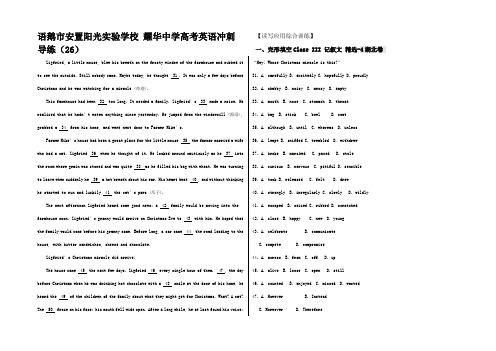
语鹅市安置阳光实验学校耀华中学高考英语冲刺导练(26)【读写应用综合训练】一、完形填空Cloze III 记叙文精选-4湖北卷Zigfried, a little mouse, blew his breath on the frosty window of the farmhouse and rubbed it to see the outside. Still nobody came. Maybe today, he thought 31 . It was only a few days before Christmas and he was watching for a miracle (奇迹).This farmhouse had been 32 too long. It needed a family. Zigfried’s 33 made a noise. He realized that he hadn’t eaten anything since yesterday. He jumped from the windowsill (窗沿), grabbed a 34 from his home, and went next door to Farmer Mike’s.Farmer Mike’s house had been a great place for the little mouse 35 the farmer married a wife who had a cat. Zigfried 36 when he thought of it. He looked around cautiously as he 37 into the room where grain was stored and was quite 38 as he filled his bag with wheat. He was turning to leave when suddenly he 39 a hot breath about his ear. His heart beat 40 , and without thinking he started to run and luckily 41 the cat’s paws (爪子).The next afternoon Zigfried heard some good news: a 42 family would be moving into the farmhouse soon. Zigfried’s granny would arrive on Chris tmas Eve to 43 with him. He hoped that the family would come before his granny came. Before long, a car came 44 the road leading to the house, with butter sandwiches, cheese and chocolate.Zigfried’s Christmas miracle did arrive!The house came 45 the next few days. Zigfried 46 every single hour of them. 47 , the day before Christmas when he was drinking hot chocolate with a 48 smile at the door of his home, he heard the 49 of the children of the family about what they might get for Christmas. What? A cat? The 50 froze on his face; his mouth fell wide open. After a long while, he at last found his voice: “Hey! Whose Christmas miracle is this?”31. A. carefully B. excitedly C. hopefully D. proudly32. A. shabby B. noisy C. messy D. empty33. A. mouth B. nose C. stomach D. throat34. A. bag B. stick C. bowl D. coat35. A. although B. until C. whereas D. unless36. A. leapt B. sniffed C. trembled D. withdrew37. A. broke B. marc hed C. paced D. stole38. A. curious B. nervous C. pitiful D. sensible39. A. took B. released C. felt D. drew40. A. strongly B. irregularly C. slowly D. wildly41. A. escaped B. seized C. rubbed D. scratched42. A. close B. happy C. new D. young43. A. celebrate B. communicateC. competeD. compromise44. A. across B. from C. off D. up45. A. alive B. loose C. open D. still46. A. counted B. enjoyed C. missed D. wasted47. A. However B. InsteadC. MoreoverD. Therefore48. A. bitter B. forced C. polite D. satisfied49. A. introduction B. discussionC. commentD. debate50. A. blood B. smile C. tear D. sweat二、阅读理解Reading Comprehension█阅读微技能 Micro Reading Skills解析与训练系列 12微技能12:理解指代关系Reference指代关系的考查要求考生根据语境判断代词(this, that,it,they,them,one等)或代动词(do,does, did等)指代的内容。
高考英语冲刺导练高三全册英语试题_24
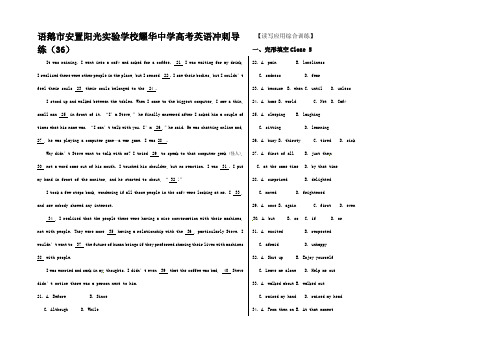
语鹅市安置阳光实验学校耀华中学高考英语冲刺导练(36)【读写应用综合训练】一、完形填空Cloze 5It was raining. I went into a café and asked for a coffee. 21 I was waiting for my drink, I realized there were other people in the place, but I sensed 22 . I saw their bodies, but I couldn’t feel their souls 23 their souls belonged to the 24 .I stood up and walked between the tables. When I came to the biggest computer, I saw a thin, small man 25 in front of it. “I’m Steve,” he finally answered af ter I asked him a couple of times what his name was. “I can’t talk with you. I’m 26 ,”he said. He was chatting online and, 27 , he was playing a computer game—a war game. I was 28 .Why didn’t Steve want to talk with me? I tried 29 to speak to that computer geek (怪人), 30 not a word came out of his mouth. I touched his shoulder, but no reaction. I was 31 . I put my hand in front of the monitor, and he started to shout, “ 32 !”I took a few steps back, wondering if all those people in the café were looking at me. I 33 , and saw nobody showed any interest.34 , I realized that the people there were having a nice conversation with their machines, not with people. They were more 35 having a relationship with the 36 , particularly Steve. I wouldn’t want to 37 the future of human beings if they preferred sharing their lives with machines38 with people.I was worried and sank in my thoughts. I didn’t even 39 that the coffee was bad, 40 Steve didn’t notice there was a person next to him.21. A. Before B. SinceC. AlthoughD. While 22. A. pain B. lonelinessC. sadnessD. fear23. A. because B. when C. until D. unless24. A. home B. world C. Net D. Café25. A. sleeping B. laughingC. sittingD. learning26. A. busy B. thirsty C. tired D. sick27. A. first of all B. just the nC. at the same timeD. by that time28. A. surprised B. delightedC. movedD. frightened29. A. once B. again C. first D. even30. A. but B. so C. if D. or31. A. excited B. respectedC. afraidD. unhappy32. A. Shut up B. Enjoy yourselfC. Leave me aloneD. Help me out33. A. walked about B. walked outC. raised my handD. raised my head34. A. From then on B. At that momentC. In allD. Above all35. A. interested in B. tired ofC. careful aboutD. troubled by36. A. computer B. soulC. shopD. geek37. A. tell B. plan C. imagine D. design 38. A. other than B. instead ofC. except forD. as well as39. A. pretend B. understandC. insistD. realize40. A. as if B. just asC. just afterD. even though二、阅读理解Reading Comprehension Test☑ Reading Skills阅读理解能力考查5 理解文章的基本结构、上下文的逻辑关系[能力解析]:对文章的基本结构的理解有助于深刻准确的理解文章,考查涉及语篇中的段与段、句与句的逻辑联系,即全篇文脉的把握;判断文体特征和语言风格, 推测文章出处;细节与主题的支持关系;➢Passage 1 How Room Designs Affect Our Work and FeelingsArchitects have long had the feeling that the places we live in can affect our thoughts, feelings and behaviors. But now scientists are giving this feeling an empirical (经验的,实证的) basis. They are discovering how to design spaces that promote creativity, keep people focused and lead to relaxation.Researches show that aspects of the physical environment can influence creativity. In 2007, Joan Meyers-Levy at the University of Minnesota, reported that the height of a room's ceiling affects how people think. Her research indicates that higher ceilings encourage people to think more freely, which may lead them to make more abstract connections. Low ceilings, on the other hand, may inspire a more detailed outlook.In additions to ceiling height, the view afforded by a building may influence an occupant's ability to concentrate. Nancy Wells and her colleagues at Cornell University found in their study that kids who experienced the greatest increase in greenness as a result of a family move made the most gains on a standard test of attention.Using nature to improve focus of attention ought to pay off academically, and it seems to, according to a study led by C. Kenneth Tanner, head of the School Design & Planning Laboratory at the University of Georgia. Tanner and his team found that students in classrooms with unblocked views of at least 50 feet outside the window had higher scores on tests of vocabulary, language arts and maths than did students whose classrooms primarily overlooked roads and parking lots.Recent study on room lighting design suggests than dim (暗淡的) light helps people to loosen up. If that is true generally, keeping the light low during dinner or at parties could increase relaxation. Researchers of Harvard Medical School also discovered that furniture with rounded edges could help visitors relax.So far scientists have focused mainly on public buildings. "We have a very limited number of studies, so we're almost looking at the problem through a straw (吸管)," architect David Allison says. "How do you take answers to very specific questions and make broad, generalized use of them? That's what we're all struggling with."64. What does Joan Meyers-Levy focus on in her research?A. Light.B. Ceilings.C. Windows.D. Furniture.65. The passage tells us that ______.A. the shape of furniture may affect people's feelingsB. lower ceilings may help improve students' creativityC. children in a dim classroom may improve their gradesD. students in rooms with unblocked views may feel relaxed66. The underlined sentence in the last paragraph probably means that _______.A. the problem is not approached step by stepB. the researches so far have faults in themselvesC. the problem is too difficult for researchers to detectD. research in this area is not enough to make generalized patterns67. Which of the following shows the organization of the passage?CP: Central Point P: Point SP: Sub-point(次要点) C: Conclusion➢Passage 2It is hardly surprising that clothing manufacturers (生产商) follow certain uniform standards for various features of clothes. What seems strange, however, is that the standard adopted for women is the opposite of the one for men. Take a look at the way your clothes button. Men’s clothes tend to button from the right, and women’s form the left. Considering most of the world's population—men and women—are right-handed, the men’s standard would appear to make more sense for women. So why do women’s clothes button from the left?History really seems to matter here. Buttons first appeared only on the clothes of the rich in the 17th century, when rich women were dressed by servants. For the mostly right-handed servants, having women’s shirts button from the left would be easier. On the other hand, having men’s shirts button form the right made sense, too. Most men dressed themselves, and a sword drawn from the left with the right hand would be less likely to get caught in the shirt.Today women are seldom dressed by servants, but buttoning form the left is still the standard for them. Is it interesting? Actually, a standard, once set, resists change. At a time when all women’s shirts buttoned form the left, it would have been risky fo r any single manufacturer to offer women’s shirts that buttoned from the right. After all, women had grown so used to shirts which buttoned from the left and would have to develop new habits and skills to switch. Besides, some women might have found it socially awkward to appear in public wearing shirts that buttoned from the right, since anyone who noticed that would believe they were wearing men’s shirts.64. What is surprising about the standard of the clothing industry?A. It has been followed by the industry for over 400 years.B. It is different for men’s clothing and women’s.C. It works better with men than with women.D. It fails to consider right-handed people.65. What do we know about the rich men in the 17th century?A. They tended to wear clothes without buttons.B. They were interested in the historical matters.C. They were mostly dressed by servants.D. They drew their swords from the left.66. Women’s clothes still button from the left today because _______.A. adopting men’s style is improper for womenB. manufacturers should follow standardsC. modern women dress themselvesD. customs are hard to change67. The passage is mainly developed by _______.A. analyzing causesB. making comparisonsC. examining differencesD. following the time order☑话题5 世界环境 World & Environment[话题解析] 人类所处的世界和环境是高考常见话题,包含内容较广泛。
2021高考英语导学大一轮人教考点规范练31(选修7 Unit 1) Word版含解析
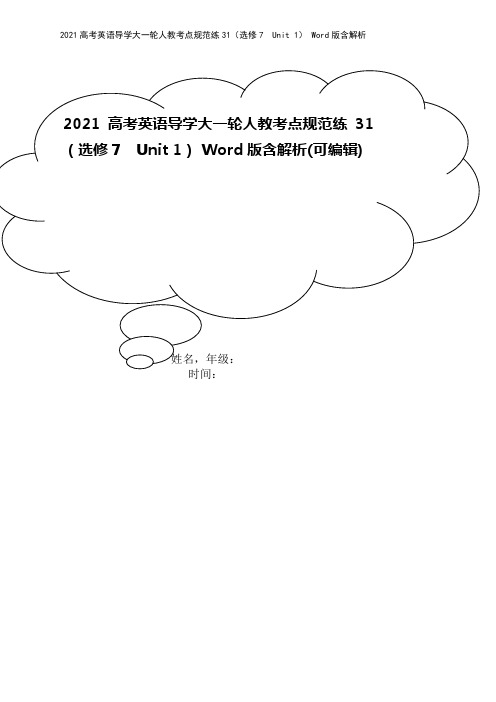
考点规范练31(选修7Unit 1)Ⅰ.阅读理解“Well,I made it,” says Greg Daniels with a smile。
Recently there have been news reports and television shows reporting on the quality of school lunches。
According to federal guidelines,French fries count as a serving of vegetables.Many parents and others are upset that a salty,deep-fried food is replacing healthier options like carrot sticks.As a result,the potato—what French fries are made of—has been getting a bad rap.“The problem is not the potato,” insists Greg。
“Potatoes are very healthy。
But any food,even the carrot or lettuce(生菜),will be less healthy if it’s cooked in grease(油脂)."Two months ago,Greg decided to eat nothing but potatoes for 60 days.As a high school science teacher and son of a potato farmer,he wanted to do something to draw attention to potatoes as a healthy food and a good choice as part of anyone's regular meals。
- 1、下载文档前请自行甄别文档内容的完整性,平台不提供额外的编辑、内容补充、找答案等附加服务。
- 2、"仅部分预览"的文档,不可在线预览部分如存在完整性等问题,可反馈申请退款(可完整预览的文档不适用该条件!)。
- 3、如文档侵犯您的权益,请联系客服反馈,我们会尽快为您处理(人工客服工作时间:9:00-18:30)。
天津市耀华中学2017届高考英语冲刺导练(32)【读写应用综合训练】一、完形填空Cloze 1Roberta appeared on the stage. She took a deep breath and began to 16 . Now she was Portia, a strong–willed 17 in Shakespeare’s The Merchant of Venice. The theater was filled with people. She was speaking with a power she had never before experienced, the words flowing 18 from her.19 , Roberta had never acted in her life before the audition (选拔试演). She 20 being in front of other people. She was very 21 at school. She had never thought she was good enough at anything to 22 much attention. She stayed mostly to herself, making 23 friends. She had excellent grades, 24 she always thought that something was missing.Two weeks before the audition, Roberta’s mother had heard about it and 25 her to join in.“I can’t think of anyone else better suited to 26 the part. Remember all the plays you used to act out for us?”Her mother wouldn’t let the 27 drop. “You’re just a little scared. Everyone gets scared. You know you 28 do it. The trick is to look past the 29 to find the love of what you’re doing.’’So Roberta had made an appointment with the head of the Drama Club. She had read the play and found herself excited by the 30 of speaking such rich words. In secret she practiced Port ia’s part, 31 the lines by repeating them over and over. It wasn’t hard; she 32 every minute of it. Every time she spoke the words, she had a new 33 of the lines, as if Shakespeare had written Portia on many levels.On the day of the audition, she 34 two of Portia’s famous speeches for the auditors. When she had finished, the head of the Drama Club announced the 35 was hers.16. A. sing B. dance C. speak D. report17. A. member B. actress C. player D. character18. A. weakly B. rapidly C. smoothly D. slowly19. A. At first B. In fact C. After all D. In all20. A. hated B. enjoyed C. appreciated D. regretted21. A. honest B. shy C. polite D. patient22. A. avoid B. focus C. pay D. attract23. A. few B. a few C. several D. many24. A. or B. so C. for D. but25. A. forced B. requestedC. encouragedD. reminded26. A. accept B. play C. offer D. learn27. A. role B. matter C. interest D. grade28. A. can B. must C. may D. should29. A. anger B. pain C. sadness D. fear30. A. purpose B. way C. idea D. importance31. A. memorizing B. organizingC. checkingD. improving32. A. disliked B. loved C. expected D. bore33. A. consideration B. descriptionC. selectionD. understanding34. A. practiced B. plannedC. performedD. delivered35. A. part B. play C. speech D. position二、阅读理解Reading Comprehension Test☑Reading Skills阅读理解能力■考查 1理解、获取文中具体信息[能力解析] 用于阐释主旨的事实与细节,有些直接,有些则间接。
考查具体信息提及与否, 判断信息正误或各种Wh-问题相关的信息;➢Passage 1Our library offers different types of studying places and provides a good studying environment.ZonesThe library is divided into different zones. The upper floor is a quiet zone with over a thousand places for silent reading, and places where you can sit and work with your own computer. The reading places consist mostly of tables and chairs. The ground floor is the zone where you can talk. Here you can find sofas and armchairs for group work.ComputersYou can use your own computer to connect to the Wi-Fi specially prepared for notebook computers; you can also use library computers, which contain the most commonly used applications, such as Microsoft Office. They are situated in the area known as the Experimental Field on the ground floor. Group-study PlacesIf you want to discuss freely without disturbing others, you can book a study room or sit at a table on the ground floor. Some study rooms are for 2-3 people and others can hold up to 6-8 people. All rooms are marked on the library maps.There are 40 group-study rooms that must be booked via the website. To book, you need an active University account and a valid University card. You can use a room three hours per day, nine hours at most per week. Storage of Study MaterialThe l ibrary has lockers for students to store course literature. When you have obtained at least 40 credits(学分), you may rent a locker and pay 400 SEK for a year’s rental period. Rules to be followedMobile phone conversations are not permitted anywhere in the library. Keep your phone on silent as if you were in a lecture and exit the library if you need to receive calls. Please note that food and fruit are forbidden in the library, but you are allowed to have drinks and sweets with you.36. The library’s upper floor is mainly for students to _______.A. read in a quiet placeB. have group discussionsC. take comfortable seatsD. get their computers fixed37. Library computers on the ground floor _______.A. help students with their field experimentsB. contain software essential for schoolworkC. are for those who want to access the Wi-FiD. are mostly used for filling out application forms38. What condition should be met to book a group-study room?A. A group must consist of 8 people.B. Three-hour use per day is the minimum.C. One should first register at the university.D. Applicants must mark the room on the map.39. A student can rent a locker in the library if he ______.A. can afford the rental feeB. attends certain coursesC. has nowhere to put his booksD. has earned the required credits40. What should NOT be brought into the library?A. Mobile phonesB. Orange juice.C. Candy.D. Sandwiches.➢Passage 2 2016浙江卷DTwo things changed my life: my mother and a white plastic bike basket. I have thought long and hard about it and it’s true. I would be a different person if my mom hadn’t turned a silly bicycle accessory into a life lesson I carry with me today.My mother and father were united in their way of raising children, but it mostly fell to my mother to actually carry it out. Looking back, I honestly don’t know how she did it. Managing the family budget must have been a very hard task, but she made it look effortless. If we complained about not having what another kid did, we’d hear something like, “I don’tcare what so-and-so got for his birthday, you are not getting a TV in your room a car for your birthday a lavish sweet 16 party.” We had to earn our allowance by doing chores around the house. I can still remember how long it took to polish the legs of our coffee table. My brothers can no doubt remember hours spent cleaning the house. Like the two little girls growing up at the White House, we made our own beds (no one left the house until that was done) and picked up after ourselves. We had to keep track of our belongings, and if something was lost, it was not replaced.It was summer and, one day, my mother drove me to the bike shop to get a tire fixed— and there it was in the window, white, shiny, plastic and decorated with flowers, the basket winked at me and I knew—I knew—I had to have it.“It’s beautiful,” my mother said when I pointed it out to her,”What a neat basket.”I tried to hold off at first, I played it cool for a short while. But then I guess I couldn’t stand it any longer: “Mo m, please can I please, please get it? I’ll do extra chores for as long as you say, I’ll do anything, but I need that basket, I love that basket. Please, Mom. Please?”I was desperate.“You know,” she said, gently rubbing my back while we both stared at what I believe was the coolest thing ever,” If you save up you could buy this yourself.”“By the time I make enough it’ll b e gone!”“Maybe Roger here could hold it for you,” she smiled at Roger, the bike guy.“He can’t hold it for that long, Mom. Someone else will buy it. Please, Mom, Please?”“There might be another way,” she said.And so our paying plan unfolded. My mother bought the beautiful basket and put it safely in some hidi ng place I couldn’t find. Each week I eagerly counted my growing saving increased by extra work here and there (washing the car, helping my mother make dinner,delivering or collecting things on my bike thatalready looked naked without the basket infront). And then, weeks later, I counted,re-counted and jumped for joy. Oh ,happy day!I made it! I finally had the exact amount we’dagreed upon....Days later the unthinkable happened. A neighborhood girl I’d played with millions oftimes appeared with the exact same basket fixedto her shiny, new bike that already had all thebells and whistles. I rode hard and fast hometo tell my mother about this disaster. Thishorrible turn of events.And then came the lesson. I’ve taken withme through my life: “Honey, Yo ur basket isextra-special,” Mom said, gently wiping awaymy hot tears. “Your basket is special becauseyou paid for it yourself.”55. What can we learn from the first two paragraphs?A. The children enjoyed doing housework.B. The author came from s well-offfamilyC. The mother raised her children in anunusual wayD. The children were fond of the US president’s daughters.56. When the author saw the basket in the window,she ______.A. fell in love with itB. stared at hermother C. recognized it at once D. wentup to the bike guy57. Why did the author say many “please” toher mother?A. She longed to do extra work.B. She was eager to have the basket.C. She felt tired after standing too long.D. She wanted to be polite to her moth er.58. By using “naked” (Paragraph 12),theauthor seems to stress that the basket was______.A. something she could affordB. something important to herC. something impossible to getD. something she could do without59. To the author, it seemed to be a horrible turn of events that ______. A. something spoiled her paying plan B. the basket cost more than she had saved C. a neighborhood girl had bought a new bike D. someone else had got a basket of the same kind 60. What is the life lesson the author learned from her mother? A. Save money for a rainy day B. Good advice is beyond all price. C. Earn your bread with your sweat D. God helps those who help themselves ☑Hot topics 高考高频话题 ■话题1 学校教育 School Life & Education [话题解析] 学校和教育话题是高考阅读高频选材之一。
